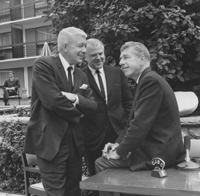

Year Born: 1908
Year Died: 1969
Pioneer
Willis, James Frank (1908-1969)
J. Frank Willis, made famous by the 1936 Moose River mine disaster, wanted to be a commercial artist and when he was 20 went from his hometown of Halifax to New York to study art. After he qualified, he worked for a time at the Paramount studios at Long Island. But he could see the depression coming and in 1930 he went home and into business for himself.
His radio career started with freelance work for CHNS Halifax which had its debut in 1925. He produced, wrote and announced radio shows, and then produced and acted in plays, including a Sherlock Holmes series. His younger brother Austin, later to find success in show business, also had his start with a group of actors who were heard in the early days of CHNS. Frank started an evening hour of poetry reading to organ music, initially called Harbour Lights and later Atlantic Nocturne, and produced a Sunday afternoon piano music program, Ampico. They brought him a total of $15 a week, he recounted in the memoir J. Frank Willis: My life on the Air, by Jock Carroll.
The Canadian Radio Broadcasting Commission, forerunner of the CBC, was formed and CHNS originated programs for the new network until the CBC established its own Halifax studios. Frank gave up his commercial art and accepted the job of regional director for the Maritimes. His job was to produce and announce shows and look for talent.
In 1936, the Moose River mine disaster occurred, when two company directors from Toronto and an employee were trapped on Easter Sunday by a rock fall in an abandoned mine 100 kilometres east of Halifax. Frank was the only CRBC staffer east of Montreal but initially he was denied permission to cover the story in competition with the print media. By the time he received permission, the story was eight days old and rescuers had just detected renewed signs of life below.
He took with him an old table microphone and engineers Cecil Landry of CHNS and Arleigh Canning of the CRBC. The multitude of print reporters on the scene initially blocked him from using the single telephone line that connected the scene but Maritime Telephone and Telegraph ruled that Frank could have two five-minute spots an hour. Then he had to negotiate with every party-line user on the line not to eavesdrop but to listen to his broadcasts on the radio – otherwise the reports would have been almost inaudible.
He made his first broadcast at 6 p.m. and continued every half hour for 69 hours with a single break when the CRBC forced him to take two hours off after a furious outburst on the air about inaccurate print reports.
Frank’s reports were carried live on 708 radio stations through Canada and the U.S. and also across the U.K. and France. He made a record 99 broadcasts. The event revolutionized the understanding of what radio could do. It had been perceived as a mainly entertainment medium. Now it was recognized as a fast – even live – news source. One of the two rescued men (the third died) said later the rescue would probably not have been made but for the presence of the news media because officials had given the trapped men up for dead. The newspapers of The Canadian Press voted the Moose River rescue the top radio news story of the first half of the 20th Century.
Frank’s rich voice was already familiar to radio listeners across Canada for his poetry readings. Atlantic Nocturne was revived under the title Nocturne when Frank was moved to Toronto. He was joined by the famous British theatre pipe organist, Quentin McLean.
With his newfound fame, Frank was flooded with lucrative offers but stayed with the CRBC and then the CBC. He was sent on a producer exchange with the Australian Broadcasting Commission and returned in 1939 to help with arrangements for the first royal tour of Canada and to produce radio documentaries. In the late ’50s he switched to television and, until he retired in 1963, hosted the CBC-TV current affairs program Close-Up.
J. Frank Willis died of a heart attack on October 26th 1969.
Written by Jerry Fairbridge – November, 2002
